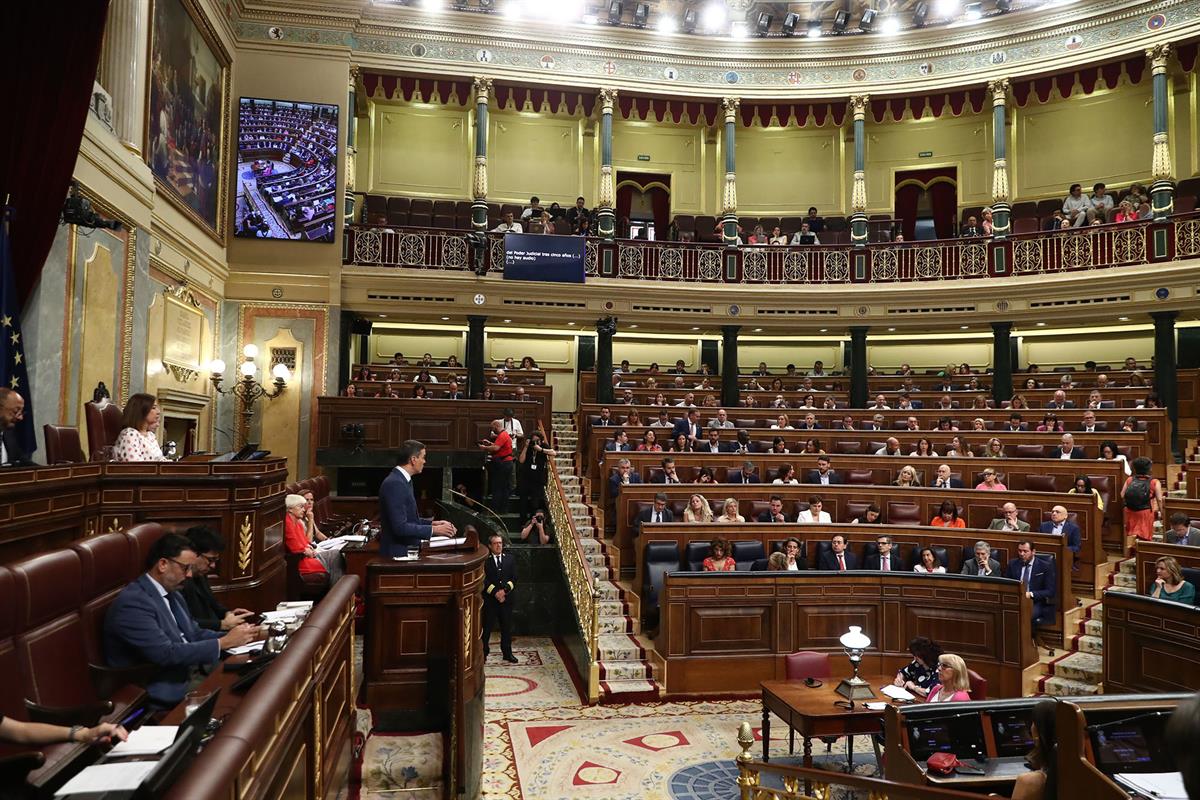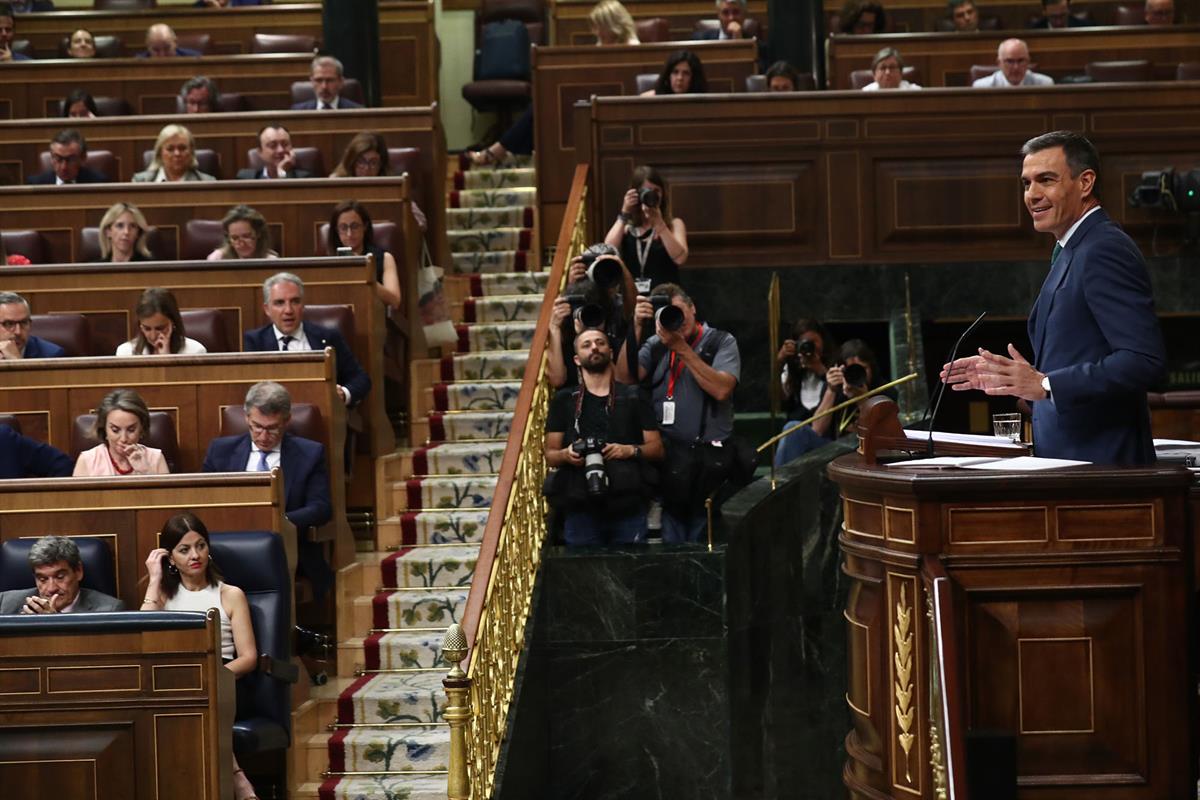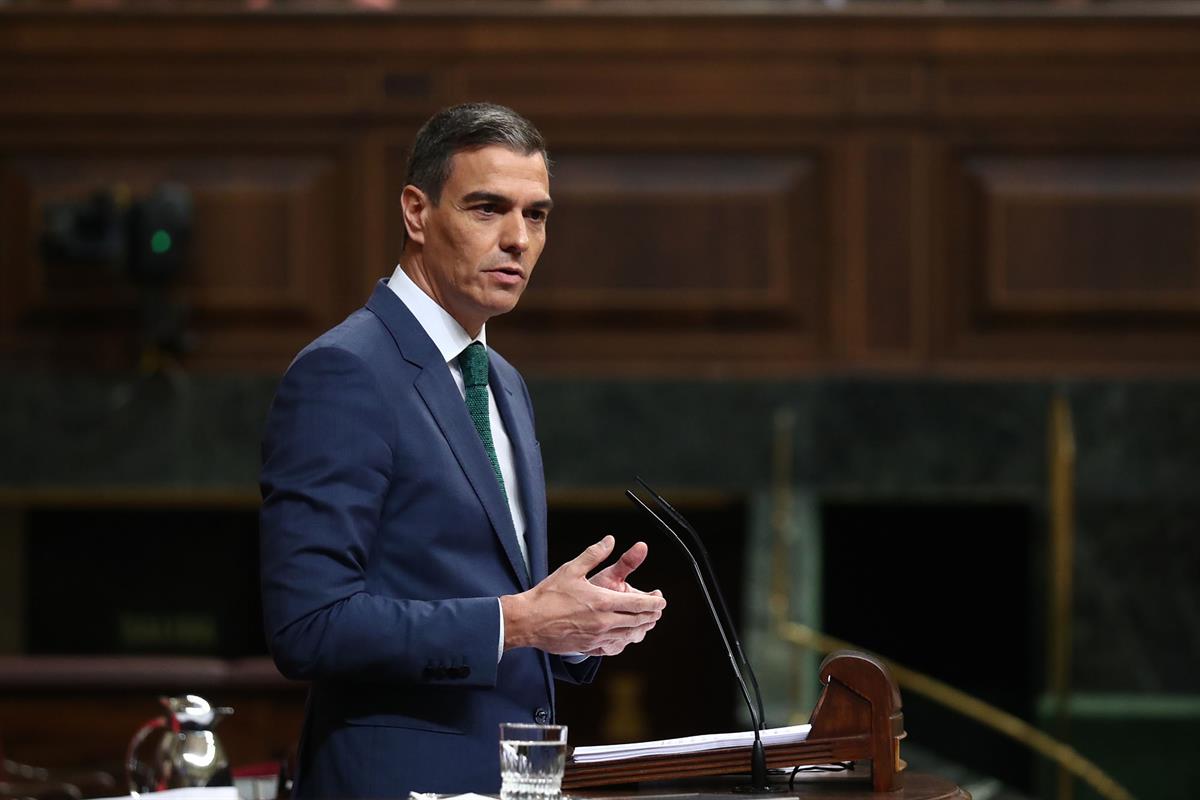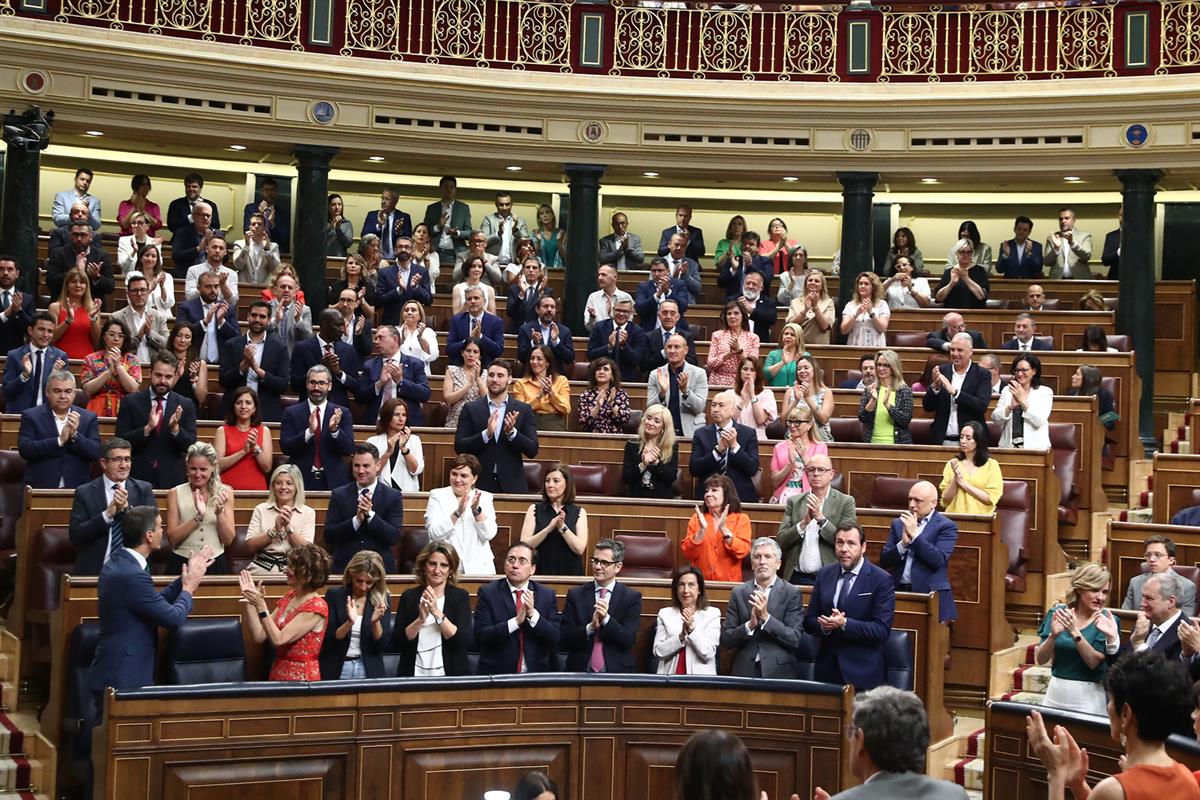Pedro Sánchez presents the Democracy Action Plan to achieve "more transparency and accountability"
President's News - 2024.7.17
Lower House of Parliament, Madrid
 The President of the Government of Spain, Pedro Sánchez, during his appearance at the extraordinary session in the Lower House of Parliament (Pool Moncloa/Fernando Calvo)
The President of the Government of Spain, Pedro Sánchez, during his appearance at the extraordinary session in the Lower House of Parliament (Pool Moncloa/Fernando Calvo)
Pedro Sánchez has appeared in the Lower House of Parliament in an extraordinary session to report, at his own request, on the decisions adopted at the European Councils held on 17 and 27 June and to set out the main lines of the new Democracy Action Plan, which the Executive has outlined to promote transparency and accountability.
The President of the Government of Spain explained that the main measures of this strategy will address changes in the executive branch and the media, and will propose reforms to the legislative branch to strengthen freedom of expression and guarantee the right to truthful information as enshrined in Article 20 of the Constitution.
"It is neither the Government's mission nor its intention to hand out reliability cards between some media outlets and others. That is the job of citizen", said Pedro Sánchez, "but it is the duty of the public authorities to implement what has been agreed in Europe", continued the head of the Executive, who stressed that with the implementation of this plan, the rules approved in Europe will be applied in Spain.
"All the measures contained in the Plan share four fundamental elements: they derive from the Democracy Action Plan approved in the EU; they follow the precepts of the Spanish Constitution; they reinforce the transparency of our democracy and they respond to common sense", assured Pedro Sánchez, who announced that he would begin a round of contacts with all parliamentary groups in the coming days to propose this plan and called on the other forces to reach "a cross-cutting agreement".
EU response to the phenomenon of disinformation, foreign interference and hate speech
 The President of the Government of Spain, Pedro Sánchez, during his appearance at the extraordinary session in the Lower House of Parliament | Pool Moncloa/Fernando Calvo
The President of the Government of Spain, Pedro Sánchez, during his appearance at the extraordinary session in the Lower House of Parliament | Pool Moncloa/Fernando Calvo
The president explained that the EU's Strategic Agenda, approved by the Council on 27 June, sets defending democracy among the priorities of the Member States, an area which includes the plan outlined today in the Lower House.
"Democracy has old enemies with new and powerful tools," said Pedro Sánchez, who cited disinformation and fake news as the phenomena that are being used to weaken democracies throughout the West, including in Spain.
For this reason, the president explained, the European Commission began to draw up a Democracy Action Plan in 2020 with several regulations and directives, and now it is the European Commission itself that has asked the Member States to take measures to protect the freedom, transparency and pluralism of the media by combating disinformation, foreign interference and hate speech.
With the Democracy Action Plan, whose measures are - in the president's words - "objective, technically sound and necessary to defend the rule of law and democracy", Spain joins countries such as Germany, Finland and Austria, which have already begun to adopt changes in this regard.
More transparency in the executive and legislative branches
At the executive level, the Democracy Action Plan proposes new transparency and citizen participation measures. "We will approve a National Open Government Strategy and we will present a new Open Public Administration Act to the groups, which will expand and improve the quantity and quality of government information," the president said.
At this point, Pedro Sánchez announced that Spain will host the ninth Global Summit of the Open Government Partnership in Vitoria-Gasteiz in autumn 2025, an event in which more than 2,000 experts and government leaders from all over the world will participate.
In relation to the measures proposed in the legislative branch, the head of the Executive expressed the need to reform the regulations of the Upper and Lower Houses in order to toughen sanctions for those members who do not declare their assets and activities, or who do so with false or incomplete information.
In addition, the Democracy Action Plan proposes reinforcing the transparency of the electoral system, with a reform of the law that has a dual objective: to establish the mandatory nature of electoral debates and to make it obligatory to incorporate microdata and the methodology for estimating results in all published electoral surveys.
Media: transparency, independence, pluralism and protection
 The President of the Government of Spain, Pedro Sánchez, during his appearance at the extraordinary session in the Lower House of Parliament | Fotos: Pool Moncloa/Fernando Calvo
The President of the Government of Spain, Pedro Sánchez, during his appearance at the extraordinary session in the Lower House of Parliament | Fotos: Pool Moncloa/Fernando Calvo
In relation to the media, the Democracy Action Plan will focus on strengthening transparency and pluralism, an objective of the new European Media Freedom Regulation, adopted in March with the votes in favour of all groups in the European Parliament, with the exception of the far-right.
According to Pedro Sánchez, Spain must now develop the measures envisaged in the European Regulation, which can be summarised in four main principles: transparency, independence, pluralism and protection.
Thus, the president of the Government of Spain has proposed limiting the funding that public administrations can devote to the media, "so that there are no media that have more public financiers than readers and to ensure that there are no parties that buy editorial lines with taxpayers' money". To this end, the Law on Institutional Advertising, which was passed 20 years ago, will be updated.
Moreover, the Plan proposes measures to protect editorial independence and the rights of media professionals; mechanisms to defend pluralism and competition to prevent media concentration; and measures to ensure media and consumer rights vis-à-vis large digital platforms.
The president also announced 100 million euros in aid from European funds for the digitisation of the media, earmarked for the creation of databases, the development of tools to improve news quality and the strengthening of cybersecurity. Pedro Sánchez also announced the Government's intention to reinforce citizens' rights to honour and rectification, and to present a proposal to reform the Law on Citizen Security with regard to freedom of expression.
Spain, "driver of the European project"
 The President of the Government of Spain appears in the Lower House of Parliament | Pool Moncloa/Fernando Calvo
The President of the Government of Spain appears in the Lower House of Parliament | Pool Moncloa/Fernando Calvo
In addition to defending democracy, the EU's Strategic Agenda sets security and competitiveness as top priorities for the remainder of the decade. In this context, the head of the Executive stressed Spain's "leading" role in the decisions adopted at recent EU Councils and its profile as the "driving force" of the European project: "Spain is no longer one of Europe's trailing carriages, it is one of its locomotives," said Pedro Sánchez.
On this point, the president of the Government of Spain listed, as examples of Spain's commitment to international law, the promotion of the request for a ceasefire in Gaza and the recognition of the State of Palestine. He also underlined the determination to further strengthen the security and defence industry and the "unwavering" support for Ukraine. And, as an example of Spain's defence of multilateralism, he announced that Seville will host the Fourth Conference on Financing for Development, which will take place in July 2025.
In the economic chapter, Pedro Sánchez stressed the need to reindustrialise Europe and to do so in a "sustainable and fair" manner. In this context, the president mentioned examples of investment for the creation of industry and green jobs such as the giant electric battery factory in Navalmoral de la Mata and the Semidynamics factory in Barcelona.
He also announced that in the coming days the Executive will launch four new programmes with more than 2.3 billion euros to accelerate the energy transition in areas such as green hydrogen and the renewable energy value chain.
Agreement on EU leadership: Von Der Leyen, Costa and Kallas
The president of the Government of Spain began his speech by referring to the agreement reached in the Council on 25 June on senior EU officials. The leaders of the three main political families agreed on the people who are expected to fill these posts: Ursula von der Leyen as President of the European Commission; Antonio Costa as President of the European Council; and Kaja Kallas as the new High Representative for Foreign Affairs.
With regard to the Estonian prime minister, Pedro Sánchez has stressed that he will continue the "extraordinary work" of his predecessor, Josep Borrell, whose figure he has vindicated.
Non official translation




